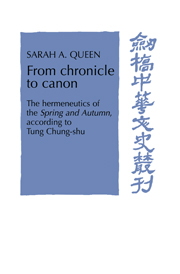Book contents
- Frontmatter
- Contents
- List of tables
- Acknowledgments
- List of abbreviations
- 1 Introduction
- PART I Three perspectives on the authenticity of the Ch'un-ch'iu fan-lu
- PART II Exegesis and canonization
- 5 The Spring and Autumn and Kung-yang tradition
- 6 Reforming the Ch'in laws
- 7 The wider circle of Han jurisprudence
- 8 Refashioning the imperial rites
- 9 Canon, cosmos, and court patronage
- 10 Conclusion
- Appendix 1 The birth and death dates of Tung Chung-shu
- Appendix 2 The dates of the Han-shu 56 memorials
- Appendix 3 Han transmission of Kung-yang learning
- Appendix 4 Han dynasty disciples of Tung Chung-shu
- Appendix 5 Citations and titles attributed to Tung Chung-shu
- Appendix 6 Transmission of Ch'un-ch'iu fan-lu editions
- Selected bibliography
- Index
6 - Reforming the Ch'in laws
Published online by Cambridge University Press: 10 December 2009
- Frontmatter
- Contents
- List of tables
- Acknowledgments
- List of abbreviations
- 1 Introduction
- PART I Three perspectives on the authenticity of the Ch'un-ch'iu fan-lu
- PART II Exegesis and canonization
- 5 The Spring and Autumn and Kung-yang tradition
- 6 Reforming the Ch'in laws
- 7 The wider circle of Han jurisprudence
- 8 Refashioning the imperial rites
- 9 Canon, cosmos, and court patronage
- 10 Conclusion
- Appendix 1 The birth and death dates of Tung Chung-shu
- Appendix 2 The dates of the Han-shu 56 memorials
- Appendix 3 Han transmission of Kung-yang learning
- Appendix 4 Han dynasty disciples of Tung Chung-shu
- Appendix 5 Citations and titles attributed to Tung Chung-shu
- Appendix 6 Transmission of Ch'un-ch'iu fan-lu editions
- Selected bibliography
- Index
Summary
Kung-yang exegetes of the Han were the heirs to a rich tradition of interpretation. Pre-Han expositors endowed the Spring and Autumn with profound ethical significance; in this sense it had become the paradigmatic ‘morality book.’ The transformative, censorial, and prophetic powers derived from this moral dimension of the text colored Han readings of the Spring and Autumn. Scholastics like Tung Chung-shu and his disciples transmitted these beliefs while expanding and redefining the attributes they ascribed to the Spring and Autumn. Indeed, the dialogues in the Ch'un-ch'iu fan-lu suggest that during the Han, scriptural interpretation constituted one of the main arenas in which scholars worked through the most compelling and urgent issues of their day. There, for example, they endeavored to renegotiate the parameters of political power and textual authority; to redefine their relationship to the state; and to reform what they perceived to be the worst abuses of the previous dynasty. In doing so, they endowed the Spring and Autumn with ethical, political, legal, historical, religious, and cosmological significance relevant to their reformist goals and the circumstances of their age. This chapter examines Tung Chung-shu's legal interpretations of the Spring and Autumn and his efforts to reform the laws that the Han dynasty inherited from the Ch'in.
The Ch'in legacy
Two broad concerns shaped Tung Chung-shu's readings of the Spring and Autumn. On the one hand, he was troubled that the legacy of the preceding Ch'in dynasty continued to shape the policies of his day.
- Type
- Chapter
- Information
- From Chronicle to CanonThe Hermeneutics of the Spring and Autumn according to Tung Chung-shu, pp. 127 - 162Publisher: Cambridge University PressPrint publication year: 1996
- 1
- Cited by

